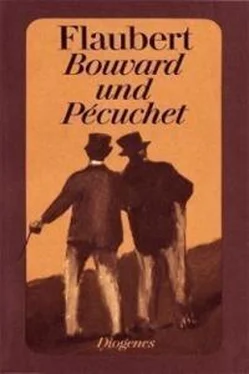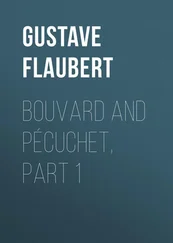"So much the better! They did right," said Madame Bordin.
Marescot smiled disdainfully as he gazed at the different objects. He did not understand this galoche having been the sign of a hosier, nor the purport of the earthenware cask—a common cider–keg—and, to be candid, the St. Peter was lamentable with his drunkard's physiognomy.
Madame Bordin made this observation:
"All the same, it must have cost you a good deal?"
"Oh! not too much, not too much."
A slater had given it to him for fifteen francs.
After this, she found fault on the score of propriety with the low dress of the lady in the powdered wig.
"Where is the harm," replied Bouvard, "when one possesses something beautiful?" And he added in a lower tone: "Just as you are yourself, I'm sure."
(The notary turned his back on them, and studied the branches of the Croixmare family.)
She made no response but began to play with her long gold chain. Her bosom swelled out the black taffeta of her corsage, and, with her eyelashes slightly drawn together, she lowered her chin like a turtle–dove bridling up; then, with an ingenuous air:
"What is this lady's name?"
"It is unknown; she was one of the Regent's mistresses, you know; he who played so many pranks."
"I believe you; the memoirs of the time―"
And the notary, without giving her time to finish the sentence, deplored this example of a prince carried away by his passions.
"But you are all like that!"
The two gentlemen protested, and then followed a dialogue on women and on love. Marescot declared that there were many happy unions; sometimes even, without suspecting it, we have close beside us what we require for our happiness.
The allusion was direct. The widow's cheeks flushed scarlet; but, recovering her composure almost the next moment:
"We are past the age for folly, are we not, M. Bouvard?"
"Ha! ha! For my part, I don't admit that."
And he offered his arm to lead her towards the adjoining room.
"Be careful about the steps. All right? Now observe the church window."
They traced on its surface a scarlet cloak and two angels' wings. All the rest was lost under the leads which held in equilibrium the numerous breakages in the glass. The day was declining; the shadows were lengthening; Madame Bordin had become grave.
Bouvard withdrew, and presently reappeared muffled up in a woollen wrapper, then knelt down at the prie–dieu with his elbows out, his face in his hands, the light of the sun falling on his bald patch; and he was conscious of this effect, for he said:
"Don't I look like a monk of the Middle Ages?"
Then he raised his forehead on one side, with swimming eyes, and trying to give a mystical expression to his face. The solemn voice of Pécuchet was heard in the corridor:
"Don't be afraid. It is I." And he entered, his head covered with a helmet—an iron pot with pointed ear–pieces.
Bouvard did not quit the prie–dieu. The two others remained standing. A minute slipped away in glances of amazement.
Madame Bordin appeared rather cold to Pécuchet. However he wished to know whether everything had been shown to them.
"It seems to me so." And pointing towards the wall: "Ah! pray excuse us; there is an object which we may restore in a moment."
The widow and Marescot thereupon took their leave. The two friends conceived the idea of counterfeiting a competition. They set out on a race after each other; one giving the other the start. Pécuchet won the helmet.
Bouvard congratulated him upon it, and received praises from his friend on the subject of the wrapper.
Mélie arranged it with cords, in the fashion of a gown. They took turns about in receiving visits.
They had visits from Girbal, Foureau, and Captain Heurtaux, and then from inferior persons—Langlois, Beljambe, their husbandmen, and even the servant–girls of their neighbours; and, on each occasion, they went over the same explanations, showed the place where the chest would be, affected a tone of modesty, and claimed indulgence for the obstruction.
Pécuchet on these days wore the Zouave's cap which he had formerly in Paris, considering it more in harmony with an artistic environment. At a particular moment, he would put the helmet on his head, and incline it over the back of his neck, in order to have his face free. Bouvard did not forget the movement with the halberd; finally, with one glance, they would ask each other whether the visitor was worthy of having "the monk of the Middle Ages" represented.
What a thrill they felt when M. de Faverges' carriage drew up before the garden gate! He had only a word to say to them. This was the occasion of his visit:
Hurel, his man of business, had informed him that, while searching everywhere for documents, they had bought up old papers at the farm of Aubrye.
That was perfectly true.
Had they not discovered some letters of Baron de Gonneval, a former aide–de–camp of the Duke of Angoulême, who had stayed at Aubrye? He wished to have this correspondence for family reasons.
They had not got it in the house, but they had in their possession something that would interest him if he would be good enough to follow them into their library.
Never before had such well–polished boots creaked in the corridor. They knocked against the sarcophagus. He even went near smashing several tiles, moved an armchair about, descended two steps; and, when they reached the second chamber, they showed him under the canopy, in front of the St. Peter, the butter–pot made at Noron.
Bouvard and Pécuchet thought that the date might some time be of use. Through politeness, the nobleman inspected their museum. He kept repeating, "Charming! very nice!" all the time giving his mouth little taps with the handle of his switch; and said that, for his part, he thanked them for having rescued those remains of the Middle Ages, an epoch of religious faith and chivalrous devotion. He loved progress, and would have given himself up like them to these interesting studies, but that politics, the General Council, agriculture, a veritable whirlwind, drove him away from them.
"After you, however, one would have merely gleanings, for soon you will have captured all the curiosities of the department."
"Without vanity, we think so," said Pécuchet.
However, one might still discover some at Chavignolles; for example, there was, close to the cemetery wall in the lane, a holy–water basin buried under the grass from time immemorial.
They were pleased with the information, then exchanged a significant glance—"Is it worth the trouble?"—but already the Count was opening the door.
Mélie, who was behind it, fled abruptly.
As he passed out of the house into the grounds, he observed Gorju smoking his pipe with folded arms.
"You employ this fellow? I would not put much confidence in him in a time of disturbance."
And M. de Faverges sprang lightly into his tilbury.
Why did their servant–maid seem to be afraid of him?
They questioned her, and she told them she had been employed on his farm. She was that little girl who poured out drink for the harvesters when they came there two years before. They had taken her on as a help at the château, and dismissed her in consequence of false reports.
As for Gorju, how could they find fault with him? He was very handy, and showed the utmost consideration for them.
Next day, at dawn, they repaired to the cemetery. Bouvard felt with his walking–stick at the spot indicated. They heard the sound of a hard substance. They pulled up some nettles, and discovered a stone basin, a baptismal font, out of which plants were sprouting. It is not usual, however, to bury baptismal fonts outside churches.
Pécuchet made a sketch of it; Bouvard wrote out a description of it; and they sent both to Larsoneur. His reply came immediately.
Читать дальше








![Гюстав Флобер - Закат Карфагена [Сборник]](/books/414440/gyustav-flober-zakat-karfagena-sbornik-thumb.webp)


